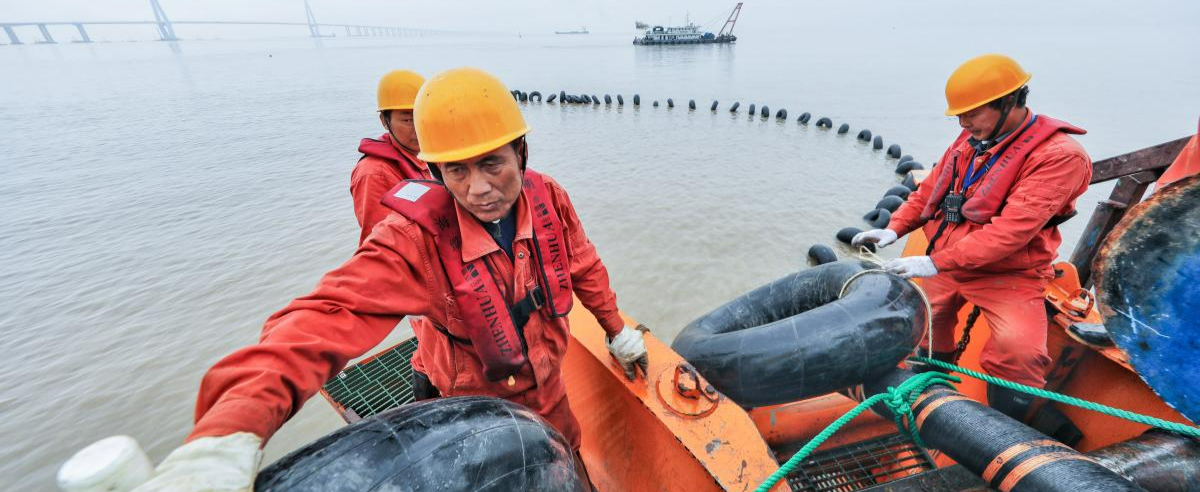Four Years After Being Blacklisted by the US? “We Really Don’t Care.”

For decades, the United States and a few of its allies have dominated the submarine cable market. During the Trump administration, the U.S. purportedly promoted the Clean Network initiative under the guise of “national security risks,” which was essentially aimed at suppressing Chinese high-tech companies. In 2020, the U.S. blacklisted Wuhan-based FiberHome Telecommunication Technologies Co., Ltd. (referred to as FiberHome) and blocked the company from purchasing American technology. Fast forward four years, on June 26, the Nikkei Asia published an extensive report stating that despite facing U.S. restrictions, FiberHome, a Chinese submarine cable manufacturer, not only remained undaunted but even saw a positive trend emerging in the business realm post-sanctions.
The report suggests that in order to penetrate crucial markets, a diplomatic competition between China and the U.S. is unfolding in the submarine cable sector. The rise of the Chinese cable industry not only challenges the entrenched dominance of the U.S. and its allies but also highlights the difficulty in curbing China’s progress. A FiberHome executive surname Wu responded, “We don’t care about being on the U.S. blacklist,” indicating that the tense relations with the U.S. have actually brought more opportunities to the company as China has begun promoting self-sufficiency and self-reliance in submarine cable technology, increasing orders for domestic manufacturers. “In terms of
submarine communication cables, China can manufacture all components; we do not need foreign technology.”
 The Broadband World Forum was held in Berlin, Germany, in 2018, featuring the booth of FiberHome Communications.
The Broadband World Forum was held in Berlin, Germany, in 2018, featuring the booth of FiberHome Communications.
The report notes that an early leader in China’s submarine cable construction was actually Huawei, a telecommunications equipment giant based in Shenzhen that has been repeatedly targeted by U.S. sanctions. Its subsidiary, Huawei Marine Networks Co., Ltd. (now known as Hengtong Optic-Electric Co., Ltd.), was one of the first Chinese tech companies to be blacklisted by the U.S. in 2019. FiberHome, initially a terrestrial cable manufacturer, followed Huawei’s lead and established its marine equipment business at the end of 2015, gradually taking on domestic projects. After Huawei Marine (then a Huawei subsidiary) was blacklisted by the U.S., FiberHome accelerated its investment pace.
However, in 2020, both FiberHome and several other Chinese tech companies were targeted by the U.S. government and added to the trade blacklist. Unable to access American technology, FiberHome opted for self-reliance, from constructing key components to purchasing its own cable-laying ships. According to insiders, FiberHome has also invested in multiple Chinese optical chip developers. The company stated that in less than a decade, it has completed projects to build or upgrade submarine cables in regions such as the Philippines, Malaysia, Indonesia, Chile, Southern Europe, and the Middle East, spanning thousands of kilometers. Representatives from FiberHome expressed a desire to further expand—anywhere that wouldn’t bring them too close to U.S. territory or allies. “Expanding in some regions of the U.S. and Europe is more difficult, but it’s okay, we can operate in Southeast Asia and Latin America.”
The Nikkei Asia highlights the quiet rise of Chinese companies like FiberHome, underscoring how challenging it is to curb China’s progress in an industry sector that the U.S. has long mastered.
 On May 16, 2023, in Wuhan, Hubei Province, the 19th “China Optics Valley” International
On May 16, 2023, in Wuhan, Hubei Province, the 19th “China Optics Valley” International
Optoelectronics Exposition opened at the Optics Valley Science and Technology Exhibition Center. According to reports, some experts also agree with the response of the executive surnamed Wu, stating that China does not need foreign technology in the field of fiber optic cables. Experts further point out that success in this industry relies more on diplomatic relations at the national level, where politics largely determine who can enter key markets and who cannot. “The United States’ undersea network is a tool for maintaining its hegemony,” said the executive surnamed Wu from FiberHome. “The submarine cable industry is like a members’ club; we all need the consent of other governments to establish connections with their countries.” The report highlights that the most important market for submarine cables is in the Asia-Pacific region. Data from TeleGeography, a research company based in Washington, shows that the Asia-Pacific region leads global investment in submarine cables, with projected expenditures from 2024 to 2026 surpassing any other region in the world. In the Asia-Pacific region, at least three large projects led by China are currently under construction, connecting mainland China and Hong Kong with multiple Southeast Asian countries such as the Philippines, Vietnam, Cambodia, Malaysia, Indonesia, and Singapore.
 Workers tow the last section of a submarine cable to the terminal station. (Internet Sources)
Workers tow the last section of a submarine cable to the terminal station. (Internet Sources)
In 2013, China proposed the Belt and Road Initiative, a vision that later expanded into the Digital Silk Road, where submarine cables play a crucial role in expanding China’s global influence. The report indicates that these policies have initiated the development process of the Chinese submarine cable industry. According to an analysis of enterprise and government documents by Nikkei Asia, over a span of about ten years, China has transitioned from being a partial investor in submarine cable consortia to actively financing, constructing, and upgrading at least 65 international projects. The China Academy of Information and Communications Technology (CAICT) estimates that between 2023 and 2028, a total of 770,000 kilometers of cables will be laid globally, with Chinese companies contributing 45%. Nikkei Asia bluntly states that the rise of the Chinese cable industry poses a challenge to the entrenched dominance of the United States and its allies. Antonia Hmaidi, a senior analyst at the Mercator Institute for China Studies (MERICS) in Germany, believes that in the future, there may be “increasingly parallel submarine cables,” forming two independent networks, one led by the United States and its allies, and the other led by China and its partners.
 Submarine Fiber Optic Cable Installation Diagram (Internet Sources)
Submarine Fiber Optic Cable Installation Diagram (Internet Sources)
On August 5, 2020, then-U.S. Secretary of State Mike Pompeo announced an expansion of the U.S.’s Clean Network initiative, stating the goal of excluding the influence of the Chinese government in five areas: clean carriers, clean stores, clean apps, clean cloud storage, and clean cables, aiming to completely remove Chinese companies from these areas, naming companies such as Huawei, Alibaba, WeChat, and China Mobile. In response, a Chinese Foreign Ministry spokesperson had previously emphasized that many Chinese companies currently unilaterally sanctioned by the U.S. are innocent, their technologies and products are secure, and there have been no incidents similar to Snowden or WikiLeaks cyber security events, nor have there been any instances of network monitoring similar to PRISM, Equation Group, or ECHELON. The U.S. itself is tainted, yet it talks about a clean network, which is purely absurd and ridiculous. The spokesperson urged the U.S. to correct its wrong practices, create conditions for normal economic and trade cooperation for companies from all countries, and build a free, open, and secure cyberspace worldwide. China will continue to work with countries around the world to jointly uphold a fair, just, open, non-discriminatory business environment, promote international technological exchanges and cooperation, and provide new impetus for global economic recovery and the well-being of people worldwide with secure, reliable, and high-quality information technology.
https://mp.weixin.qq.com/s/-hIh92iGshrwKQVtzvMang




